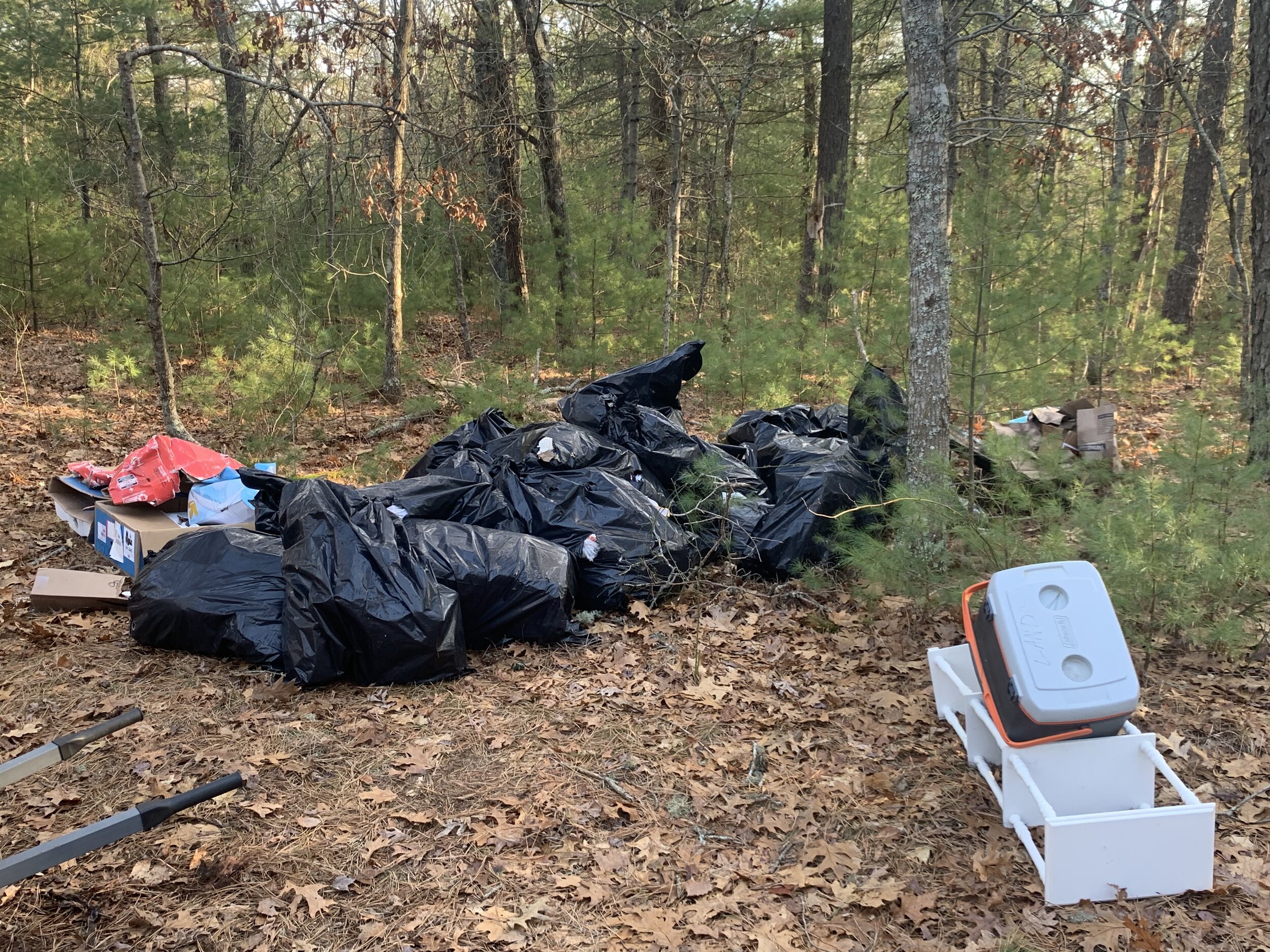On February 9, 2023, for the first time in 50 years, Wildlands Trust was forced to close a property under our care and custody, the Shifting Lots Preserve in Plymouth. The property will remain closed until further notice. We received several phone calls about hunters staged on the trail entrance to the beach; we also heard from property visitors about two off-leash dogs attacking and maiming wildlife. At that point, to protect the public from known safety issues and to protect defenseless wildlife, we instructed the Wildlands’ stewardship staff to lock the parking lot gate and to post the property as “Closed.”
Your Trash is Not Welcome Here!
By Amy Markarian, Senior Copywriter
You look outside your window and see the sun shining, a slight morning breeze cools the air. It’s a perfect day to stretch your legs on your favorite local conservation area trail. Fresh coffee in hand, you arrive with overwhelming appreciation for the beauty that abounds. You step out of your car and approach the trailhead and, in an instant, your splendid surroundings are transformed into a DUMP.
This scenario, unfortunately, is not uncommon in southeastern Massachusetts. For years, local officials, private landowners, and conservation organizations have fought an uphill battle against illegal dumping on undeveloped land. Often, the items dumped on roadsides and in the woods are those that are either expensive to dispose of legally, require a special permit that may not be available to purchase on site (when items are already loaded in a vehicle and ready to be dropped off), or are considered hazardous waste items that are not routinely accepted at transfer stations. In at least some cases--based on where materials have been found-- it seems that polluters’ intentions may have been to properly dispose of the items. But, when doing so was discovered to be costly or inconvenient, a nearby open space was found to drop the load instead. Plymouth’s expanse of undeveloped lands and unmonitored road frontage, sadly, have historically made for easy dumping grounds in these situations.
All too often, according to Wildlands Trust’s Director of Stewardship, Erik Boyer, “it seems, people view conservation land as an easy place to get rid of things.” Sometimes it’s malicious, sometimes it may not be, but it always has a negative impact on the land and those who use it. Because of the harmful implications for wildlife and water sources in areas where dumping takes place, Wildlands Trust is actively taking steps to deter polluters.
In January, Wildlands' stewardship team was alerted to a massive pile of trash that had been left at one of our Plymouth preserves. Located close to a road in a town-managed cemetery, but within the boundaries of Wildlands’ adjacent conservation land, were 40 to 50 bags of household trash and various appliances left in a sprawling heap. The sheer quantity of debris to be removed made it clear that this was going to be a costly cleanup. However, it was discovered that several items had attached mailing labels containing one person’s name and address.
Our stewardship team notified the Plymouth Police, and an investigation led to criminal charges being filed against the responsible party. MA General Law - Part IV, Title I, Chapter 270, Section 16, states:
“Whoever places, throws, deposits, or discharges...trash, bottles or cans, refuse, rubbish, garbage, debris, scrap, waste or other material of any kind on a public highway or within 20 yards of a public highway, or on any other public land, or in or upon coastal or inland waters...or within 20 yards of such waters, or on property of another, or on lands dedicated for open space purposes, including lands subject to conservation restrictions and agricultural preservation restrictions...shall be punished by a fine of not more than $5,500 for the first offense and a fine not to exceed $15,000 for each subsequent offense…”*
In this case, where the responsible party was identified, charges were pressed and the law was utilized to ensure that the burden of time and expenses associated with the cleanup would not be shouldered by a non-profit conservation organization. The Plymouth County District Attorney’s office is currently seeking restitution from the offender for the costs associated with Wildlands’ safe removal of all of the items.
Wildlands Trust hopes that this situation will serve as a reminder to others that dumping is illegal, it is detrimental to our land, water supply, and wildlife, and it will not be tolerated. We will continue to work collaboratively with the Plymouth Police Department to ensure that our community’s natural spaces remain beautiful and safe for all.
(*https://malegislature.gov/Laws/GeneralLaws/PartIV/TitleI/Chapter270/Section16)


